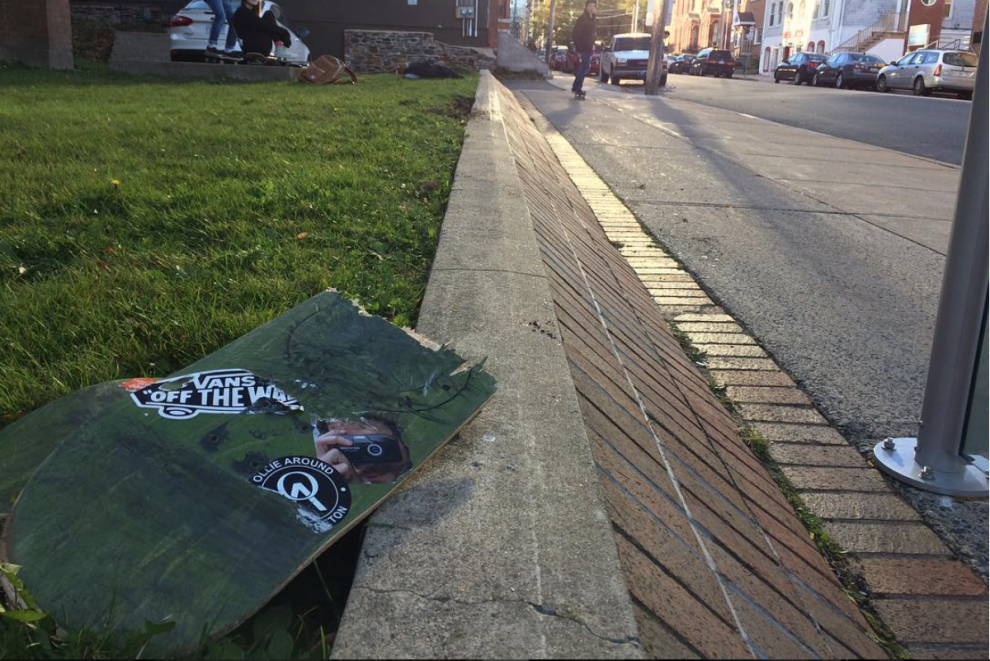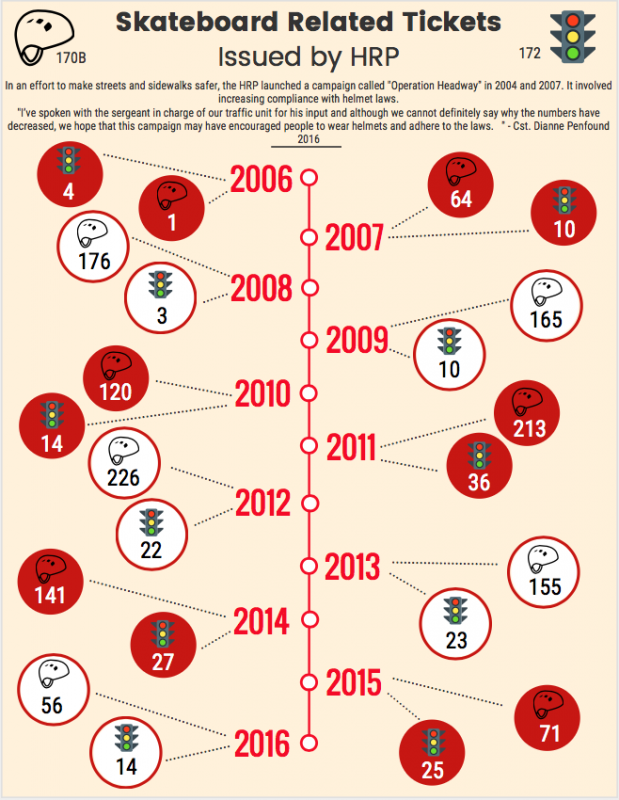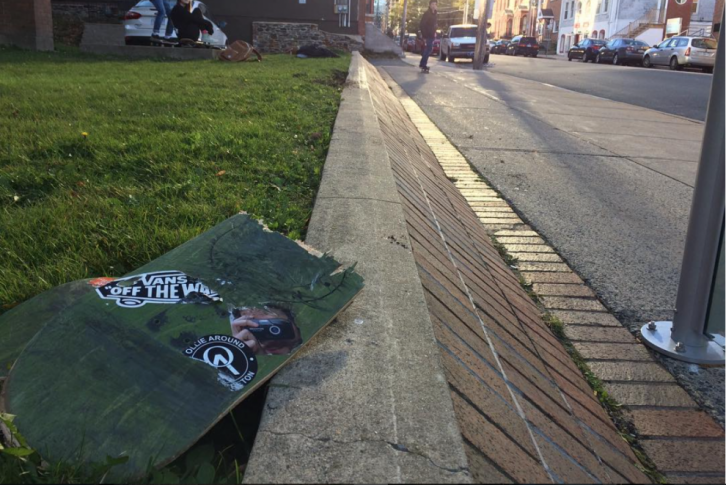HRM
Skateboarders in Halifax are fed up with a lack of clarity
We looked into the issue to find out exactly what they are allowed to do

caption
Every summer residents of the Halifax Regional Municipality are invited to community centres across the peninsula so they can rent out recreational equipment, including skateboards.
Bring a piece of ID, a helmet if you have one, and take one of these boards out at your leisure.
But where exactly do you go?
Rhonda Dea, coordinator for aquatic and leisure services for the HRM, says people who rent skateboards don’t get informed by the centres about skateboarding laws.
The Motor Vehicle Act says skateboarding on the road is illegal. This piece of provincial legislation is the only thing that governs skateboarding in Halifax but also gives permission to municipalities to enact their own individual bylaws.

caption
Section 172 of the Motor Vehicle Act
caption
Section 170 (B) of the Motor Vehicle ActCape Breton Regional Municipality has banned skateboards on all sidewalks. Wolfville has banned skateboards on sidewalks for the two streets which have the highest amount pedestrian traffic, and Queens County has banned skateboarding on certain sidewalks.
Meanwhile, Vancouver has allowed skateboarding on most roads, sidewalks, and bike lanes for years. They thoroughly outline the exact rules for skateboarders in their bylaws.
The HRM hasn’t written any bylaws on skateboarding.
According to skateboarders across the municipality, many of whom have been skateboarding for years, the laws have never been made clear to them. In addition, they say the rules against skateboarding on the road penalize alternative transportation and put pedestrians at risk.
“In my mind, I’d rather be going down a hill and me get hit, than run into a mom with her stroller on the sidewalk,” says 26-year-old Thomas Fralic. Fralic has been skateboarding for 14 years and has been ticketed three times for skateboarding illegally.
The first two times he wasn’t wearing a helmet. The third ticket he got he had been wearing a helmet, because he knew that it was the law. But he received a ticket for riding on the road, which he didn’t realize was illegal.
Fralic still skateboards on the road to this day. He doesn’t want to risk running into a pedestrian and if he can take the risk of riding with cars, he will — even if it’s against the law.

caption
Number of tickets given out by the HRP for skateboard related infractionsFralic isn’t alone. Liberal MLA for Chebucto, Joachim Stroink, takes his longboard to work and has been doing it for years.
“When I get on my skateboard in my suit and head down to Province House, I’m breaking the law,” he says. “Which I do because it’s safer (than using the sidewalk).”
Stroink says the Motor Vehicle Act is going to be revamped in the near future, but he didn’t give a timeline. When the law does get updated, the MLA says he wants it to ensure that more clarity is provided to those who use skateboards, roller skates, bikes and other forms of active transportation.
Stroink believes part of the reason there hasn’t been a change in the rules to allow skateboarders on the road is that the older generation has misconceptions.
“A skateboarder, for a lot of people, is a punk: someone who spray paints, smokes drugs, or hangs out and does nothing,” he says. “But that’s not who I am.”
Waye Mason is the HRM councillor for District 7 Halifax South Downtown. He was under the impression that an old bylaw restricted skateboard use on sidewalks. Mason was surprised to hear from The Signal that no municipal bylaws actually restricted skateboard use.
“It might be that they decided they were enforcing something that was un-enforceable,” he says.
The only time people are fined in HRM for skateboarding is when a police officer enforces the Motor Vehicle Act, not a bylaw. This fact wasn’t known by many of the skateboarders who spoke to the Signal.
If you were confused about that, you’re not alone. And Mason thinks it might be time the municipality looks into the matter.
“I don’t have clarity and I’m an elected official, so obviously we need to get that clarity and find out what’s allowed to happen and decide whether we want to look into the rules or not,” says Mason.
Stroink also thinks the municipality should figure out how it wants to deal with skateboarders, since it could be a while before new motor vehicle legislation gets passed. He says one of the ways they could deal with this is to allow skateboarders to be on the road or to use bike lanes.
“If we’re trying to create a peninsula of transportation where we’re trying to encourage more people to be active, then the conversation needs to be: how do we get more people active to and from work, at the municipal level,” he says.
He thinks the HRM needs to write some bylaws around the specifics of skateboarding.
[media-credit id=101132 align=”alignnone” width=”726″] [/media-credit]
[/media-credit]
“If you’re putting in all of these bike lanes, are skateboarders allowed to use them? There’s (a lack of) clarity,” he says.
Josh Gaudon, 21, has been skateboarding in the city for almost 13 years and has been issued between eight and 11 tickets during that time. He’s never paid any of them.
“If I wanted to get my license I would have to pay all of my tickets, which is upwards of $1,000 now,” he says. “So instead of going through that and getting a car, I just skate everywhere.”
He says that on congested streets, police sometimes tell him he can’t even skateboard on the sidewalks.
“Occasionally on Spring Garden, if it’s kind of busy, they’ll be like ‘stop’ and then I’ll go, ‘well can I go on the (road) so I’m not in anybody’s way?’ and they’ll say ‘no, just don’t skate here,’” says Gaudon. “So you can’t really get where you’re going.”
Stroink and Gaudon are of one mind on the issue. If bikes are allowed on the road, skateboards should be too.
“In the law right now it pretty much says the only place you can (skateboard) is on the sidewalk, which is inherently dangerous for the pedestrian and for the person doing the active transportation,” says Stroink.


W
William Power
S
Scott